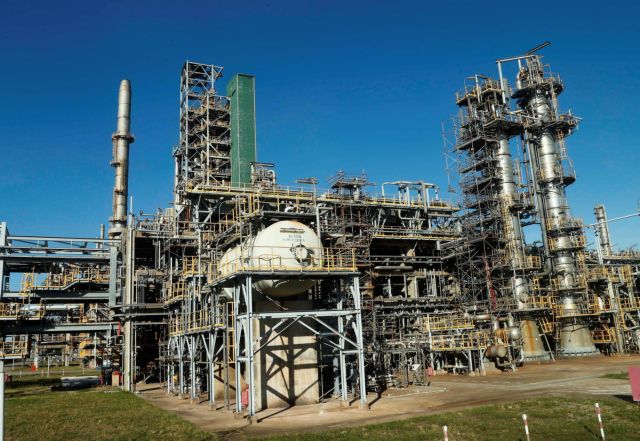 Opinion
Opinion

 |
| Dung Quất Refinery plant is located in Bình Sơn District of the central Quảng Ngãi Province with a refining capacity of 148,000 barrels a day. Việt Nam is over-dependent on fuel imports, said Sơn. VNA/VNS Photo Doãn Tuấn |
In a recent interview with Vietnam News Agency, Hà Đăng Sơn, director of the Centre for Energy and Green Growth Research talks about the impacts of the energy crisis in Europe and lessons Việt Nam can learn in ensuring energy security.
How does the energy crisis in Europe affect the economies of Europe and other countries, including Việt Nam?
There has been a hike in energy prices in Europe. It soared almost 10-fold. The economy will suffer and inflation will be almost unavoidable as energy is an important input to the economy.
Soaring energy prices have led some businesses to curb production. With the declining production, revenues of businesses also decline and the number of jobs also goes down. The GDP of European countries is forecast to reduce. Spiking energy prices also affect prices of goods, including inputs of transport and logistics sectors.
Việt Nam’s shift in energy mix means that it targets a greater proportion of renewables in the overall energy mix. It is also shifting from coal to gas sources including domestic and imported ones like LNG.
When the energy crisis occurs in Europe and other parts of the world, Việt Nam faces a great competition in the supply and the crisis will have big impacts on energy investment plan and socio-economic development plans of the country.
EU nations are implementing some measures to solve the energy crisis. What are your thoughts on those measures?
The EU has had some prompt measures to deal with the energy crisis. The first one is its plan to share the gas reserve. However, this seems to be unfeasible because reserves of the member states are insufficient to share with each other. EU nations are making efforts to buy more for their own reserves.
Secondly, the EU wants to set the price ceiling for the energy in Europe. However, this gives rise to the strong reaction of the OPEC+, which announced that it will cut oil and gas outputs. Due to the decreasing supply, EU nations have to accept higher price to meet the consumers’ needs.
This gives rise to challenges to the negotiation ability of each nation. Some developed countries with strong economic potential such as Germany or France who may have position or economic connections with other countries may receive fuel supply to solve the energy deficit. However, some other European countries with weak financial potential and political relationships will be on the weak side and have to suffer from damage to the price ceiling for fuel.
Talking about the strategy which is to look for the LNG supply from other countries to be independent from the LNG supply from Russia, some EU nations negotiated to buy gas from Norway, Middle-East and the US. However, in the LNG world market, some Asian countries are competing fiercely with the European ones in importing LNG. Asian countries are ready to bid higher prices for achieving the quantity of gas needed to supply for the newly constructed LNG factory.
In this situation, Europe can only ensure the quantity of the importation of LNG if they put the higher price. However, the higher price of LNG will lead to some trade-off between the unwanted impacts on the costs and price and the gas in European countries.
What do you anticipate will happen to the oil and gas prices and the energy reserve in winter in Europe?
Oil and gas prices are at the similar level during the crisis in Libya in 2011. A lesson learned from this is that when the price rises, many gas and oil exporters and producers tend to reduce the production to maintain the high price in two to four years, before the prices are adjusted down.
With regards to energy reserves, in order to deal with the extreme cold winter, some European countries are increasing the quantity of stored fuel within a very short time to meet the increasing demand in October and early November. Therefore, the prices of imported fuels will keep rising in the upcoming months until there will be negotiations to lower the price.
What lessons can Việt Nam learn from the energy crisis in Europe to ensure national energy security?
Việt Nam is over-dependent on imports. It imports crude oil for its two refinery plants of Dung Quất and Nghi Sơn. About 30 per cent of finished petroleum products in Việt Nam are also imported. Since 2015, Việt Nam has become a coal importer. Meanwhile, imported coal prices have risen remarkably due to the impacts of the energy crisis. In this case, Việt Nam is facing double impacts as the prices of both petroleum and coal increase.
Regarding hydropower, there is a low possibility that a new plant will be built as Việt Nam is located downstream so it has to depend on neighbouring countries for the water source like China, Laos or Cambodia. This also affects the water reserve and regulation capacity for hydropower plants as well as the irrigation needs of Việt Nam.
The Government has issued several policies to change the energy mix, avoiding over-dependence on imports. One clear example of this is that Việt Nam has encouraged the development of renewable energy sources including wind and solar energy. However, a problem is that the power transmission system has failed to catch up with the rapid and massive development of wind and solar energy. This affects sustainable development and also creates difficulties for Vietnam Electricity, (a State-owned company) which holds the highest responsibility in ensuring electricity security.
It is important that Việt Nam needs to see the problems from different perspectives. Firstly, all energy sources have their own positive and negative sides. For example, solar or wind energy is encouraged as they will help us less depend on fossil fuels. However, these two sources of energy depend much on the weather condition which is highly changeable, especially in the near future when climate change may have strong impacts on the operation of the solar and wind energy plants. This will affect the electricity supply for production activities and use in daily life.
It is a huge challenge to find a solution that can help us depend less on imported energy and increase local energy sources. Technology plays an important role here. Việt Nam must aim towards mastering technology instead of completely depending on imported technology and know-how of foreign countries. In addition, it is also crucial to encourage energy efficiency and avoid waste.
The hike in domestic petroleum prices has had a big impact on businesses and local people and the Government has handled the issue. This is done thanks to diverse sources of supply and financial measures to bring the prices down.
However, in the worst case, Việt Nam may face the scenario that there is no other plan available to handle the energy crisis. Therefore, there must have an immediate change in consumption habits in Việt Nam, and the policies should have a long-term vision and be more practical. VNS




